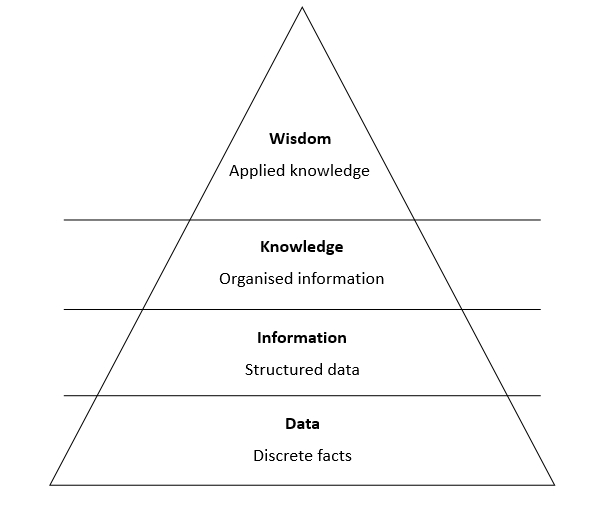Knowledge

|
Very broadly, the term ‘knowledge’ refers to organised information, such as might be found in a report.
It is differentiated from data - which refers to discrete facts (numbers and characters that in themselves have no meaning) and information - which is data that has been structured so that it does have meaning (such as text or a table).
The application of knowledge is sometimes referred to as wisdom.
Knowledge can be explicit knowledge, which has been codified and recorded, or tacit knowledge, which is experiential and more difficult to formalise.
The construction industry is a knowledge-based industry, which depends on knowledge and high skill levels, and has an increasing need for ready access to knowledge. Knowledge is vital to the construction industry, defining what is required, setting standards and explaining what is possible. It includes legislation, regulations, policy, best practice, research, innovations, news and so on. For more information see: Types of construction knowledge.
However, unlike data and information, which tend to be project based and so have clear authorship, ownership, responsibility and control, knowledge tends to be industry-wide and intra project, with no overall controlling mind. As a result, tt is fragmented, inconsistent, sometimes contradictory, and often hidden behind pay walls and membership sign ups, or held on private intranets.

|
The Construction Knowledge Task Group is working to improve the standardisation of, and access to knowledge by practitioners.
Articles about knowledge on Designing Buildings include:
- Concept-knowledge theory.
- Construction knowledge sources.
- Construction knowledge survey.
- Construction knowledge.
- Data.
- Indigenous knowledge.
- Knowledge based economy.
- Knowledge classification.
- Knowledge gap.
- Knowledge management in construction.
- Knowledge pyramid.
- Knowledge standard.
- Knowledge task group.
- Local knowledge.
- Specification for Discoverable Construction Knowledge.
- Traditional knowledge.
- Types of construction knowledge.
Featured articles and news
ECA progress on Welsh Recharging Electrical Skills Charter
Working hard to make progress on the ‘asks’ of the Recharging Electrical Skills Charter at the Senedd in Wales.
A brief history from 1890s to 2020s.
CIOB and CORBON combine forces
To elevate professional standards in Nigeria’s construction industry.
Amendment to the GB Energy Bill welcomed by ECA
Move prevents nationally-owned energy company from investing in solar panels produced by modern slavery.
Gregor Harvie argues that AI is state-sanctioned theft of IP.
Heat pumps, vehicle chargers and heating appliances must be sold with smart functionality.
Experimental AI housing target help for councils
Experimental AI could help councils meet housing targets by digitising records.
New-style degrees set for reformed ARB accreditation
Following the ARB Tomorrow's Architects competency outcomes for Architects.
BSRIA Occupant Wellbeing survey BOW
Occupant satisfaction and wellbeing tool inc. physical environment, indoor facilities, functionality and accessibility.
Preserving, waterproofing and decorating buildings.
Many resources for visitors aswell as new features for members.
Using technology to empower communities
The Community data platform; capturing the DNA of a place and fostering participation, for better design.
Heat pump and wind turbine sound calculations for PDRs
MCS publish updated sound calculation standards for permitted development installations.
Homes England creates largest housing-led site in the North
Successful, 34 hectare land acquisition with the residential allocation now completed.
Scottish apprenticeship training proposals
General support although better accountability and transparency is sought.
The history of building regulations
A story of belated action in response to crisis.
Moisture, fire safety and emerging trends in living walls
How wet is your wall?
Current policy explained and newly published consultation by the UK and Welsh Governments.
British architecture 1919–39. Book review.
Conservation of listed prefabs in Moseley.
Energy industry calls for urgent reform.



























